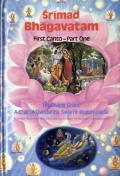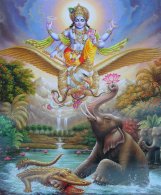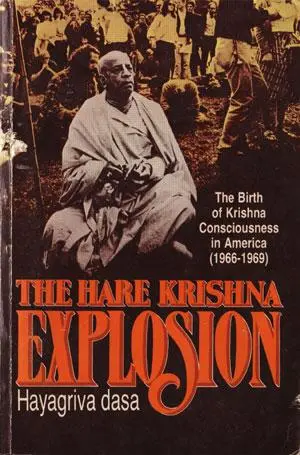11 Oct 2020
by The Hare Krishna Movement
in A.C. Bhaktivedanta Swami Prabhupada, A.C. Bhaktivedanta Swami Prabhupada, Bhagavad-gita, Bhagavad-gita As It Is 1972 Edition, Books by Srila Prabhupada, Slokas
Tags: A. c. Bhaktivedanta Swami Prabhupada, Bhagavad Gita, divyam, param brahma, param dhama, paramam bavan, pavitram, purusam, sasvatam, slokas
Some mornings after I do my morning meditation (japa), reading and study, I will pick out a nice sloka (verse) from the Bhagavad-gita or Srimad Bhagavatam, write it out on a note card and stick it in my pocket and throughout the course of the day refer to it in hopes of memorizing it. So today this sloka from the Bhagavad-gita will be my meditation and memorization exercise.
arjuna uvāca
paraṁ brahma paraṁ dhāma
pavitraṁ paramaṁ bhavān
puruṣaṁ śāśvataṁ divyam
ādi-devam ajaṁ vibhum
āhus tvām ṛṣayaḥ sarve
devarṣir nāradas tathā
asito devalo vyāsaḥ
svayaṁ caiva bravīṣi me
Arjuna said: You are the Supreme Brahman, the ultimate, the supreme abode and purifier, the Absolute Truth and the eternal divine person. You are the primal God, transcendental and original, and You are the unborn and all-pervading beauty. All the great sages such as Nārada, Asita, Devala, and Vyāsa proclaim this of You, and now You Yourself are declaring it to me.
More
08 Sep 2016
by The Hare Krishna Movement
in Qualities of Srimati Radharani, Radha Krishna, Radha Madhava, Radhastami, Slokas, Sri Radhika Stotra, Srimati Radharani, Transcendental Qualities of Radha
Tags: 108 names of Radharani, Radharani's beauty, Radhastami, Sri Raghunatha dasa Goswami, Srimati Radharani

Sri Radhika Stotra 108 Names of Srimati Radharani
by Srila Raghunatha Dasa Goswami
aviksatmesvari kascid vrndavana-mahesvarim
tat padamboja-matraika gati dasyati katara
patita tat-saras tire ruda tyartha-ravakulam
tac chri-vaktreksanavaptyai namanyetani sanjagau
Some maidservant, unable to find her Mistress, has fallen on the bank of Radhakunda, crying in great anxiety, being very eager to take exclusive shelter of Her Lotus Feet, glorifying Her by singing the following names of Her Mistress:
More
13 Aug 2013
by The Hare Krishna Movement
in A.C. Bhaktivedanta Swami Prabhupada, Bhagavad-gita, Prasadam, Slokas
Tags: A.C. Bhaktivedanta Swami Prabhupada, Krishna, Krsna prasadam, leaf flower fruit or water, love and ecstasy, offering to God, patram puspam phalam toyam, with love and devotion

One of the first slokas I ever memorized from the Bhagavad-gita was 9.26 patraṁ puṣpaṁ phalaṁ toyaṁ… “If one offers Me with love and devotion a leaf, a flower, fruit or water, I will accept it.” (Full text and purport follows). This was practically the beginning of my spiritual life. ‘Just try to love God by offering Him something, with devotion. A leaf, a flower, fruit or water.’
One does not need great wealth, education or opulence to satisfy the Supreme Personality of Godhead. If one is fully absorbed in love and ecstasy, he need offer only a flower and a little water. As stated in Bhagavad-gītā, patraṁ puṣpaṁ phalaṁ toyaṁ yo me bhaktyā prayacchati: “If one offers Me with love and devotion a leaf, a flower. fruit or water, I will accept it.” (Bg. 9.26)
The Supreme Lord can be pleased only by devotional service: therefore it is said here that the Lord is surely satisfied by devotion and nothing else. Quoting from the Gautamīya-tantra, the Hari-bhakti-vilāsa states:
tulasī-dala-mātreṇa
jalasya culukena vā
vikrīṇīte svam ātmānaṁ
bhaktebhyo bhakta-vatsalaḥ
“Śrī Kṛṣṇa, who is very affectionate toward His devotees, sells Himself to a devotee who offers merely a tulasī leaf and a palmful of water.” The Supreme Lord is causelessly merciful upon His devotee, so much so that even the poorest of men can offer Him a little water and a flower in devotion and thus please Him. This is due to His affectionate dealings with His devotees. (SB 5.3.6 purport)
Everyone is searching after peace of mind. This is obtainable only when one is completely freed from the desire for material sense gratification and is engaged in the devotional service of the Lord. As stated in Bhagavad-gītā: patraṁ puṣpaṁ phalaṁ toyaṁ yo me bhaktyā prayacchati (9.26). Worship of the Lord is not at all expensive. One can offer the Lord a leaf, a flower, a little fruit and some water. The Supreme Lord accepts these offerings when they are offered with love and devotion. In this way, one can become freed from material desires. As long as one maintains material desires, he cannot be happy. As soon as one engages in the devotional service of the Lord, his mind is purified of all material desires. Then one becomes fully satisfied. (SB 5.7.11, purport)
More
12 Jul 2013
by The Hare Krishna Movement
in A.C. Bhaktivedanta Swami Prabhupada, Prayers & Verses, Quotes by Srila Prabhupada, Slokas
Tags: A.C. Bhaktivedanta Swami Prabhupada, conversation with Srila Prabhupada, imports of Vedic knowledge, Letters by Srila Prabhupada, Prabhupada lectures, quotes by prabhupada, spiritual master, SU 6.23, Svetasvatara Upanisad, vani, vani quotes, Vedic knowledge, yasya deve para bhaktir, yatha deve tatha gurau
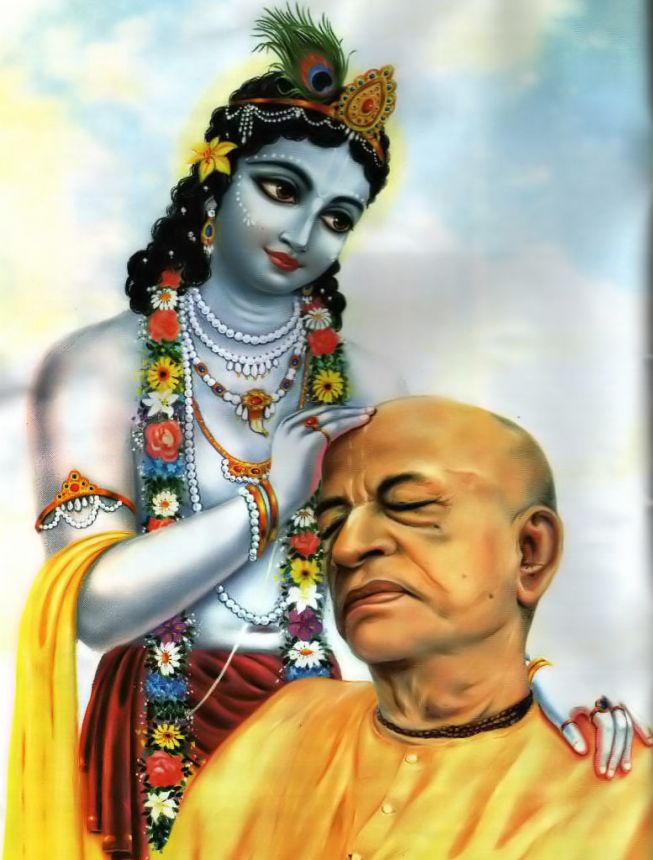
Last night I was having a discussion with a fellow vaisnava, and the following, important sloka, came up in the course of our conversation. I was reminded of a story that once Gurukrpa Swami asked Srila Prabhupada what was the most important sloka in our literature, and Srila Prabhupada responded:
yasya deve parā bhaktir
yathā deve tathā gurau
tasyaite kathitā hy arthāḥ
prakāśante mahātmanaḥ
“Only unto those great souls who have implicit faith in both the Lord and the spiritual master are all the imports of Vedic knowledge automatically revealed.” (Śvetāśvatara Upaniṣad 6.23)
I wanted to see how many times Srila Prabhupada used this sloka in his books and lectures so I went to Vani Quotes and did a search. It appears that this verse was used in:
Bhagavad-gita; 2 times
Srimad Bhagavatam; 11 times
Sri Caitanya-caritamrta; 12 times
Lectures; 43 times
Letters; 7 times
Morning Walks and Conversations; 22 times
Other books; twice
We share with you some of the the results of the Vani Quotes Research team, and thank Visnu Murti and Mayapur prabhu’s efforts.
More
14 Jun 2013
by The Hare Krishna Movement
in A.C. Bhaktivedanta Swami Prabhupada, Dedication Slokas, Srimad Bhagavatam
Tags: A.C. Bhaktivedanta Swami, collection of slokas, dedication slokas, krsne sva-dhamopagate, original books by srila prtabhupada, slokas, srila prabhupada slokas, Srimad Bhagavatam

For anyone who has had the good fortune to read and study Srila Prabhupada’s epic Srimad Bhagavatam, will know that on the title page of each and every volume is a dedication sloka. I thought it would be interesting to compile a list of the dedication slokas from all of the original books. I stopped this collection of slokas with the Tenth Canto, Part Three, as this is where Srila Prabhupada left off, and where my collection of Srimad Bhagavatam’s stops. -Vyasasan das
More
03 Jan 2013
by The Hare Krishna Movement
in A.C. Bhaktivedanta Swami Prabhupada, Gajendra, Gajendra's Prayers of Surrender, Gajendra's Prayers of Surrender, Srimad Bhagavatam
Tags: A.C. Bhaktivedanta Swami Prabhupada, elephant and the crocodile, Gajendra, indradyumna, king of the elephants, SB 8.3.1-29, Srimad Bhagavatam, Supreme Lord, The Supreme Personality of Godhead

click on image to enlarge
The following are the prayers by Gajendra, the King of the elephants, offered to the Supreme Personality of Godhead, during his difficult struggle with the crocodile. It appears that the King of the elephants was formerly a human being known as Indradyumna and that he learned a prayer to the Supreme Lord. Fortunately he remembered that prayer and began to chant it. First he offered his respectful obeisances to the Supreme Personality of Godhead, and because of his awkward position in having been attacked by the crocodile, he expressed his inability to recite prayers nicely. Nonetheless, he tried to chant the mantra and expressed himself in the prayers that follow.
…It is imperative that all devotees in Kṛṣṇa consciousness practice chanting some mantra. Certainly one should chant the Hare Kṛṣṇa mantra, which is the mahā-mantra, or great mantra, and also one should practice chanting cintāmaṇi-prakara-sadmasu or the Nṛsiṁha strotra (ito nṛsiṁhaḥ parato nṛsiṁho yato yato yāmi tato nṛsiṁhaḥ). Every devotee should practice in order to chant some mantra perfectly so that even though he may be imperfect in spiritual consciousness in this life, in his next life he will not forget Kṛṣṇa consciousness, even if he becomes an animal. Of course, a devotee should try to perfect his Kṛṣṇa consciousness in this life, for simply by understanding Kṛṣṇa and His instructions, after giving up this body one can return home, back to Godhead. Even if there is some falldown, practice of Kṛṣṇa consciousness never goes in vain. For example, Ajāmila, in his boyhood, practiced chanting the name of Nārāyaṇa under the direction of his father, but later, in his youth, he fell down and became a drunkard, woman-hunter, rogue and thief. Nonetheless, because of chanting the name of Nārāyaṇa for the purpose of calling his son, whom he had named Nārāyaṇa, he became advanced, even though he was involved in sinful activities. Therefore, we should not forget the chanting of the Hare Kṛṣṇa mantra under any circumstances. It will help us in the greatest danger, as we find in the life of Gajendra. (From Purport to text 1)
Śrīmad-Bhāgavatam
By His Divine Grace A. C. Bhaktivedanta Swami Prabhupāda
Canto 8, Chapter Three, Text 1-29
Gajendra’s Prayers of Surrender More
20 Dec 2012
by The Hare Krishna Movement
in A.C. Bhaktivedanta Swami Prabhupada, Brahma-samhita, Govinda, Govindam Prayers, Songs of the Vaisnava Acaryas, Sri Brahma-samhita
Tags: A.C. Bhaktivedanta Swami Prabhupada, Apple Records, George Harrison, Govinda, govindam adi-purusam tam aham bhajami, I worship Govinda, The Radha Krishna Temple, venum kvanantam, Yamuna devi
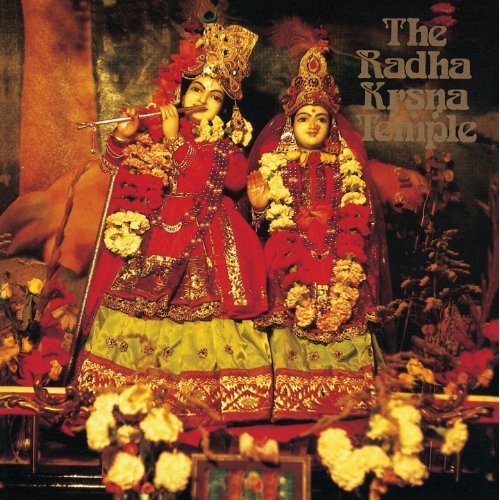
The verses 30 and 32 from the Brahma-samita are sung in the morning Srngara Arati in all ISKCON temples, while the first track of the 1970 album “Radha Krsna Temple” is played. Srila Prabhupada enjoyed this track very much and was so moved that he said that this track will play at all ISKCON temples for the Srngara Arati. As a result, no one ever leads kirtan for this song, as it is played through that track.
Govinda
The Radha Krsna Temple Album
Sung by Yamuna devi
Produced by George Harrison
veṇuṁ kvaṇantam aravinda-dalāyatākṣam-
barhāvataṁsam asitāmbuda-sundarāṅgam
kandarpa-koṭi-kamanīya-viśeṣa-śobhaṁ
govindam ādi-puruṣaṁ tam ahaṁ bhajāmi
veṇum—the flute; kvaṇantam—playing; aravinda-dala—(like) lotus petals; āyata—blooming; akṣam—whose eyes; barha—a peacock’s feather; avataṁsam—whose ornament on the head; asita-ambuda—(tinged with the hue of) blue clouds; sundara—beautiful; aṅgam—whose figure; kandarpa—of Cupids; koṭi—millions; kamanīya—charming; viśeṣa—unique; śobham—whose loveliness; govindam—Govinda; ādi-puruṣam—the original person; tam—Him; aham—I; bhajāmi—worship.
I worship Govinda, the primeval Lord, who is adept in playing on His flute, with blooming eyes like lotus petals with head decked with peacock’s feather, with the figure of beauty tinged with the hue of blue clouds, and His unique loveliness charming millions of Cupids.
aṅgāni yasya sakalendriya-vṛtti-manti
paśyanti pānti kalayanti ciraṁ jaganti
ānanda-cinmaya-sad-ujjvala-vigrahasya
govindam ādi-puruṣaṁ tam ahaṁ bhajāmi
aṅgāni—the limbs; yasya—of whom; sakala-indriya—of all the organs; vṛtti-manti—possessing the functions; paśyanti—see; pānti—maintain; kalayanti—manifest; ciram—eternally,; jaganti—the universes; ānanda—bliss; cit—truth; maya—full of; sat—substantiality; ujjvala—full of dazzling splendor; vigrahasya—whose form; govindam—Govinda; ādi-puruṣam—the original person; tam—Him; aham—I; bhajāmi—worship.
I worship Govinda, the primeval Lord, whose transcendental form is full of bliss, truth, substantiality and is thus full of the most dazzling splendor. Each of the limbs of that transcendental figure possesses in Himself, the full-fledged functions of all the organs, and eternally sees, maintains and manifests the infinite universes, both spiritual and mundane.
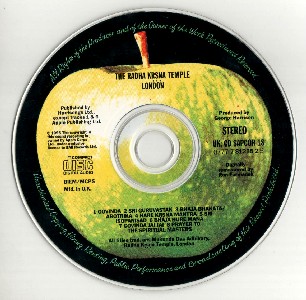
More
19 Dec 2012
by The Hare Krishna Movement
in Bhaktisiddhanta Sarasvati Thakura, Brahma-samhita, Brahma-samhita, Govindam Prayers, Prayers & Verses, Sri Brahma-samhita
Tags: ananda, Bhaktisiddhanta Sarasvati Thakura, Brahma, brahma samihita, cit, eternal blissful spiritual body, Govindam Prayers, isvarah, isvarah paramak krsna, Krishna Govinda, Lord Brahma, Lord Krsna, sac-cid-ananda-vigrahah, sat, Sri Brahma-samhita, supreme, Supreme Godhead, the controller, vigrahah

The Govindam Prayers
From Śrī Brahma-saṁhitā
By His Divine Grace Bhaktisiddhānta Sarasvatī Ṭhākura
This collection is taken from the fifth chapter of the Hymns of Brahma, and includes verse 1, and 29-56. There were 100 chapters in the Brahma Samhita. This 5th chapter of the Brahma Samhita was discovered by Lord Caitanya during His appearance. The other chapters have not yet been revealed.
More
01 Dec 2012
by The Hare Krishna Movement
in A.C. Bhaktivedanta Swami Prabhupada, Sri Isopanisad, Sri Isopanisad, Sri Isopanisad Mantras
Tags: A.C. Bhaktivedanta Swami Prabhupada, complete whole, first edition of Sri Isopanisad, free download, invocation mantra, ISKCON Books 1969, mantras, om purnam adah purnam idam, pdf download, perfect and complete, Personality of Godhead, phenomenal world, slokas, Sri Isopanisad

Śrī Īśopaniṣad The knowledge that brings one nearer to the Supreme Personality of Godhead, Krishna
The following are all eighteen mantras and the invocation from Śrī Īśopaniṣad from the original first edition, which was first published by ISKCON Books in 1969. For those of you who like to recite and memorize important slokas, we have compiled this list of the mantras along with the Roman transliteration, and English equivalents. You can click on the ‘print icon’ at bottom of post to print out the entire collection, and you can click on link at bottom for a free pdf download of entire book along with original Sanskrit Text and full Purports by His Divine Grace A.C. Bhaktivedanta Swami Prabhupada.
More
23 Nov 2012
by The Hare Krishna Movement
in A.C. Bhaktivedanta Swami Prabhupada, Prayers by Queen Kunti, Prayers by Queen Kunti, Teachings of Queen Kunti
Tags: A.C. Bhaktivedanta Swami Prabhupada, important verses from srimad bhagavatam, Krsna, kunty uvaca, mamasye purusam tvadyam, O Krsna, original personality, prayers and verses, Queen Kunti, sloka
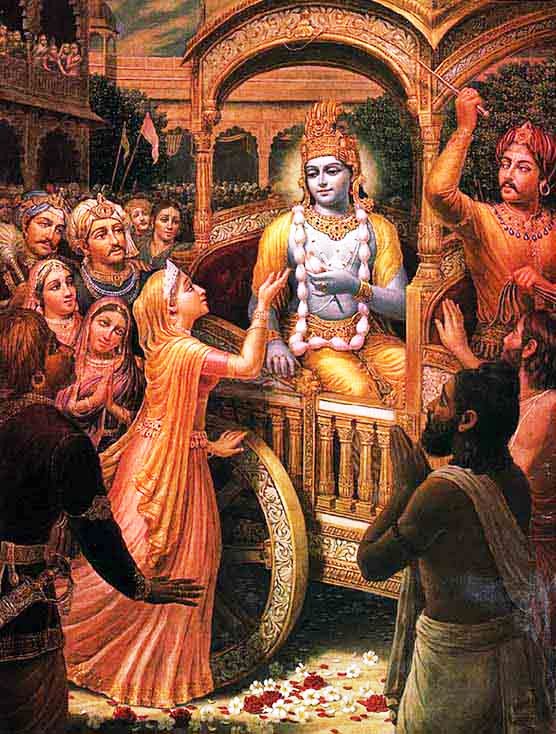
The following 25 verses (slokas) Prayers by Queen Kunti from the Srimad Bhagavatam were often quoted by Srila Prabhupada when giving lectures, and are so important that an entire book was published from the purports to these verses entitled “Teachings of Queen Kunti”. We encourage our readers to download the entire book by following the link at bottom of post for a free pdf file. You can also print these important slokas by clicking on the print icon following the post for easy reference to memorizing these famous slokas.
Srimad Bhagavatam
By His Divine Grace A.C. Bhaktivedanta Swami Prabhupada
Canto One, Chapter 8, Text 18-43
Prayers by Queen Kuntī Slokas
More
11 Nov 2012
by The Hare Krishna Movement
in A.C. Bhaktivedanta Swami Prabhupada, Caitanya Mahaprabhu, Slokas, Sri Caitanya-Caritamrta
Tags: A.C. Bhaktivedanta Swami Prabhupada. Mercy of Sri Caitanya Mahaprabhu, age of kali, Beda-kirtana Pastimes, Caitanya, congregational chanting, golden complexion, incarnation of Godhead, Madhya-lila 11. 100-104, sings the name of Krsna, Sri Caitanya Mahaprabhu, Srila Prabhupada, worship

Very Important verses and purports from Srila Prabhupada’s Sri Caitanya-caritamrta, on the Mercy of Śrī Caitanya Mahāprabhu.
” ‘In the Age of Kali, intelligent persons perform congregational chanting to worship the incarnation of Godhead who constantly sings the name of Kṛṣṇa. Although His complexion is not blackish, He is Kṛṣṇa Himself. He is accompanied by His associates, servants, weapons and confidential companions.’ “
The King said, “According to evidence given in the revealed scriptures, it is concluded that Lord Śrī Caitanya Mahāprabhu is Lord Kṛṣṇa Himself. Why, then, are learned scholars sometimes indifferent to Him?”
The Bhaṭṭācārya replied, “A person who has received but a small fraction of mercy from Śrī Caitanya Mahāprabhu can understand that He is Lord Kṛṣṇa. No one else can.
“If the mercy of Śrī Caitanya Mahāprabhu is not bestowed upon a person-regardless of how learned a scholar that person may be and regardless of his seeing or listening-he cannot accept Lord Caitanya as the Supreme Personality of Godhead.
” ‘My Lord, if one is favored by even a slight trace of the mercy of Your lotus feet, he can understand the greatness of Your personality. But those who speculate to understand the Supreme Personality of Godhead are unable to know You, even though they continue to study the Vedas for many years.’ “
More
15 Oct 2012
by The Hare Krishna Movement
in 108 Bhagavad-gita slokas, A.C. Bhaktivedanta Swami Prabhupada, Atmatattva das, Bhagavad-gita, Slokas
Tags: 108 bhagavad-gita slokas, 1972 MacMillian, A.C. Bhaktivedanta Swami Prabhupada, Atmatattva das, bhagavad-gita, bhakti sastri study guide, bhakti-sastri, Bhaktivedanta Academy, important slokas, original slokas., original translations, sloka
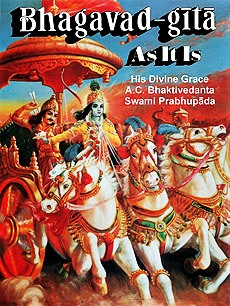
This is the list of 108 of the most important slokas from the Bhagavad-gita As It Is (1972 Macmillan Edition) by His Divine Grace A.C. Bhaktivedanta Swami Prabhupada. The index to these verses was taken from the Bhakti-sastri Study Guide compiled by Atmatattva dasa as used by the Bhaktivedanta Academy in Mayapur. [*Note for this collection of slokas, we are using the Original Translations rather than the later re-vised Translations. These were the Translations that Srila Prabhupada approved and which were memorized by heart, by all of the early disciples of His Divine Grace.]
These are important verses for memorizing. Srila Prabhupada has said, that when you quote a verse, your argument becomes authoritative.
More
31 Aug 2012
by The Hare Krishna Movement
in Caitanya Mahaprabhu, Chanting Hare Krishna, Sri Siksastaka, Sri Siksastaka, Sri Siksastakam
Tags: bhava maha davagni nirvapanam, Caitanya, ceto darpana, ceto-darpana-marjanam, chanting Hare Krishna, eitht instructions, Hare Krishna, holy name of the lord, Lord Caitanya Mahaprabhu, sri siksastaka, tṛṇad api sunicena

Śrī Śrī Śikṣāṣṭaka
Eight Instructions
Lord Śrī Caitanya Mahāprabhu
Lord Caitanya Mahāprabhu instructed His disciples to write books on the science of Kṛṣṇa, a task which His followers have continued to carry out down to the present day. The elaborations and expositions on the philosophy taught by Lord Caitanya are, in fact, the most voluminous, exacting, and consistent, due to the system of disciplic succession. Although Lord Caitanya was widely renowned as a scholar in His youth, He left only eight verses, called Śikṣāṣṭaka. These eight verses clearly reveal His mission and precepts. These supremely valuable prayers are translated herein.
More



















